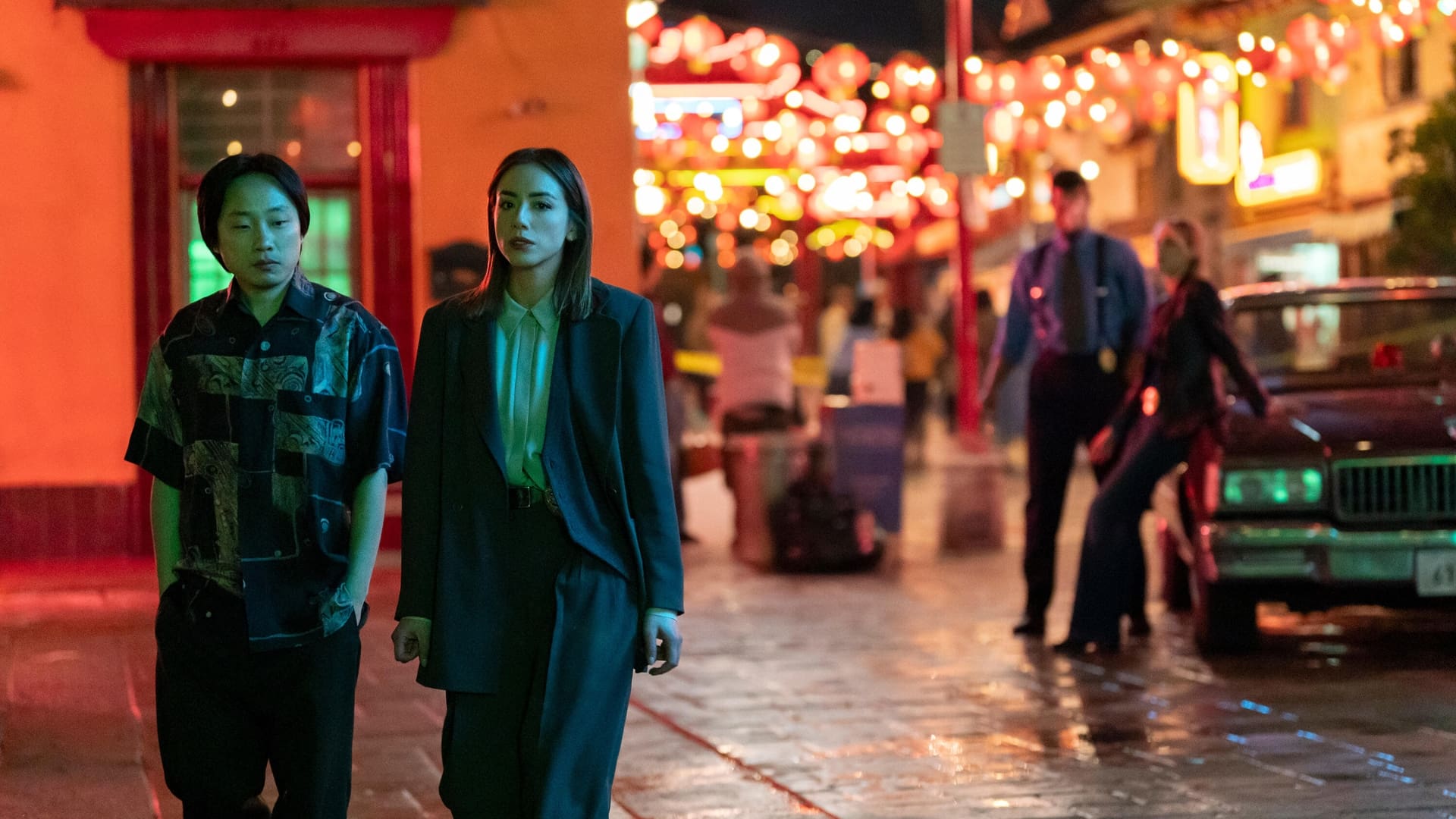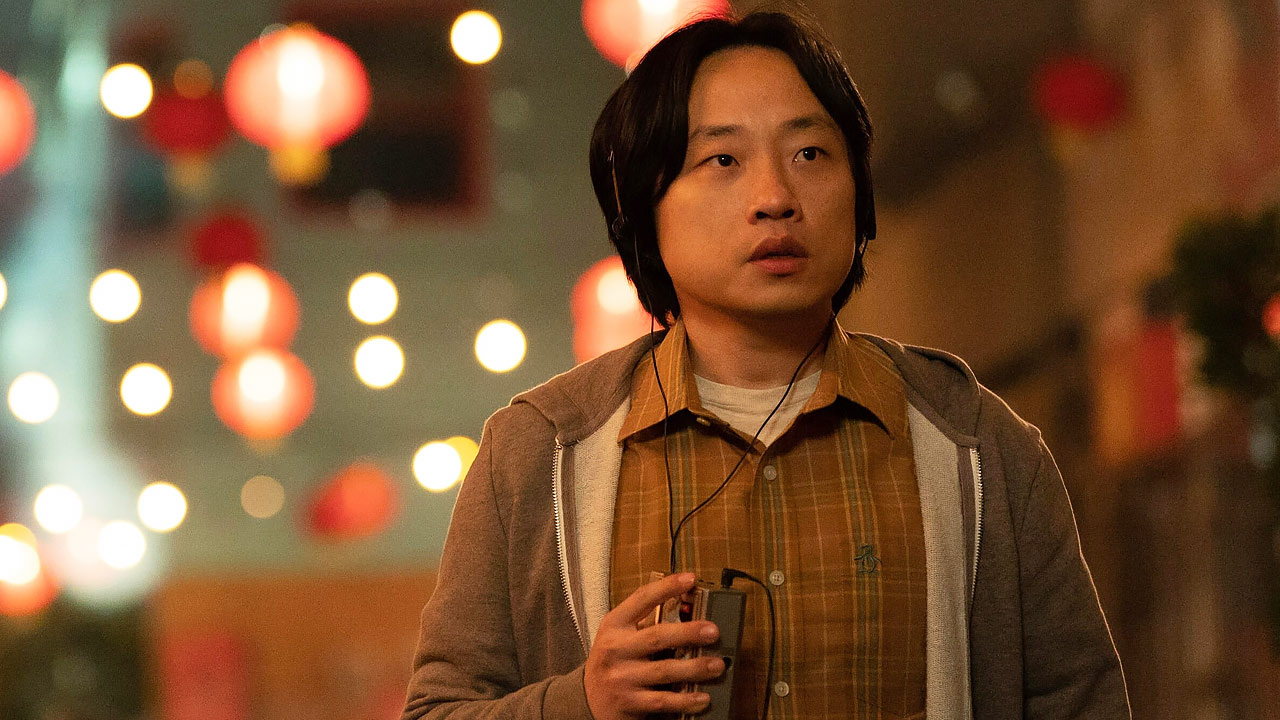The fun but exhausting metaness of Interior Chinatown

After yearning for adventure, the protagonist of zany comedy Interior Chinatown finds himself ensnared in kooky plotlines and spiralling realities. Luke Buckmaster untangles an extremely meta series.
The protagonist of Interior Chinatown can’t be taken seriously as a hero, a kung fu fighter or a quasi-investigator, despite Willis Wu (Jimmy O. Yang) being all these things. But you’re not really supposed to. The core appeal of creator Charles Yu’s zany action-comedy series—adapted from his novel of the same name—is its daydream-ish merging of the fictions inside Willis’ head with the reality of the show itself, as well as a show within the show: a Law and Order parody titled Black & White: Impossible Crimes Unit.
Confused yet? The point is that Willis’ “real” world—where he lives a humdrum life as a waiter at a Chinese restaurant—becomes part of a soup of realities and fictions, mixed up so that you can’t know where one ends and another begins. It’s the kind of production that makes a more earnest escapist story, like The Secret Life of Walter Mitty, look like a humble relic from a bygone time: the pre-post-truth era, when reality was one thing and unreality another, flights of fantasy delineated as clearly as thought bubbles above a comic strip character’s head.
Meta productions have existed for a long time, but they’re certainly in vogue, television in recent years tossing around some interesting experiments in using storytelling conventions to trigger cultural conversations, including WandaVision (the changing formats of sitcoms) and Kevin Can F**k Himself (the historical shafting of women in TV comedies). Those shows evoke a feeling of layered or parallel realities, while others extend a hand to the audience, acknowledging our presence in a higher plane of existence and bridging the gap between their world and ours. Most obviously in productions that break the fourth wall—like Fleabag and House of Cards.
Instead of reaching upwards, welcoming the viewer, Interior Chinatown reaches downwards, into the recesses of Willis’ mind, then pairs these recesses with television industry commentary, for example about how Asian actors are regularly relegated to typecast roles on the sidelines. By the time these commentaries kick in, they barely register at all: with all that jokey reality-shifting, it’s a big leap for the show to be taken seriously, and it feels like the writers are shouting to be heard above their own self-created commotion. The show’s initially bouncy metaness becomes exhausting, and takes the edge off any potentially weighty statements.

The first couple of episodes (this article encompasses the first five) get off to a good start, however. And there are some reasons to keep watching, including Jimmy O. Yang’s thoroughly enjoyable take on the everyman, roused from the slumber of his life, plus Ronny Chieng’s hilarious performance as his best friend Fatty Choi. “Nothing exciting ever happens to me, or you, or anyone we know,” Willis says to Fatty in an early scene. Those are dangerous words, guaranteeing he’ll be thrust into an awfully great adventure.
The Taika Waititi-directed pilot episode wastes no time deploying a MacGuffin: after taking out the trash Willis spots a damsel in distress, bundled into a car by goons. Soon later, the opening credits roll of the aforementioned procedural parody, the show inside the show. We’re introduced to, among others, Detective Lana Lee (Chloe Bennet), who, like Willis, drifts between realities, in her case with more dramatic purpose, enabling the protagonist’s adventures and asking him to perform minor duties (like collecting fingerprints from restaurant clientele). As the plot thickens, and loosens, and shifts, and swirls, and spins, etcetera, their partnership pushes them into a plotline in which they search for the truth about the disappearance of Willis’ older brother (Chris Pang). This becomes another core part of the show but it too doesn’t really work; we don’t have a strong emotional connection and it’s unclear how much we’re expected to accept as sincere.

But, again, there are some reasons to keep watching Interior Chinatown. I enjoyed a scene in the second episode so much I rewatched it as soon as it was over. I knew I’d seen this moment before, but it took me a little bit to realise I’d seen it not on TV but in video games. Willis follows two cop characters from the show inside the show, listening to their private conversation on the street. He behaves in ways that would cause them to stop talking in real-life: standing right up in their space, for instance, and walking between them—but they keep talking, as if he doesn’t exist.
At one point Willis even says “excuse me.” But, while these characters are right in front of him, they’re also far away in some other tier of existence. This scene is what happens in video games when NPCs deliver narratively significant dialogue, and continue, undeterred, when the player behaves unnaturally—walking around in circles, say, or bumping into walls, or turning and facing the opposite direction. It was strange and entertaining to see such a moment, as if the show not just crossed into different realities but, for a brief period, into an entirely different medium.




















